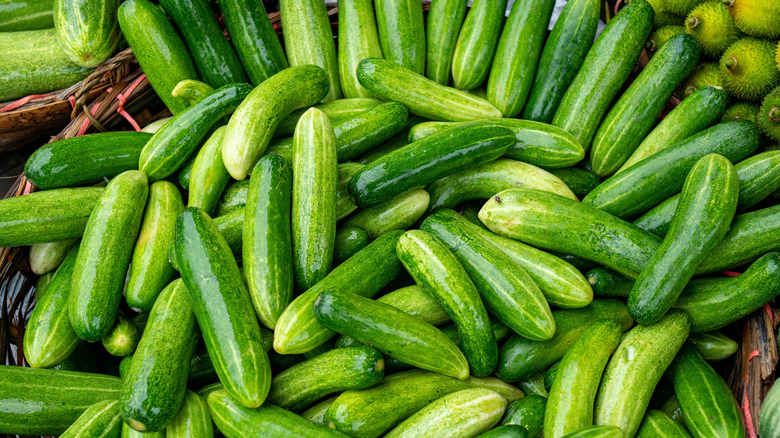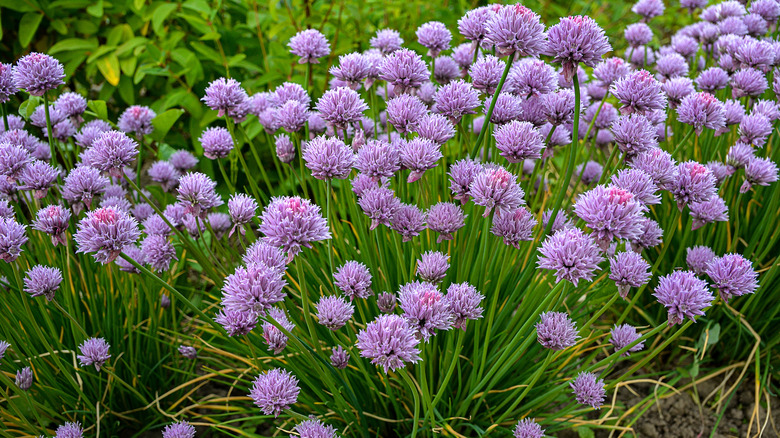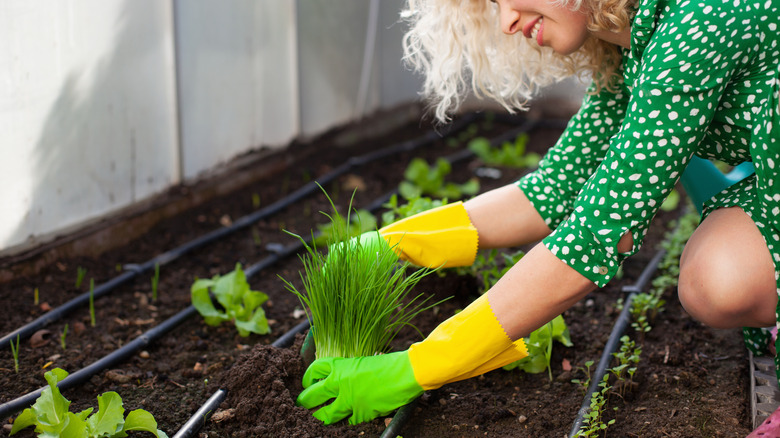The Easy-To-Grow Herb That Will Help Your Cucumber Plants Thrive In The Garden
If you're new to gardening or are simply looking for some gardening hacks that will give you an instant green thumb, don't worry — we've got you covered. While cucumbers are a relatively easy plant to grow, at the same time, the luscious long green fruit (yes, cucumbers are botanically classified as a fruit) can also be very attractive to insects. Because of this, it's a good idea that you plant some chives right next door to them in order to really help your cucumber plants thrive in your garden. The reason? Chives are easy to grow as well, but are also a great way to keep insects away from your cucumber plants due to the pungent odor they emit.
After all, it is quite the frustrating scenario to put all that effort into growing cucumbers, just to have them get absolutely ravished by insects. Now, you could also try to avoid this entirely by spraying a natural insect repellent like soap spray on your cucumber plants. However, planting chives next to them in your garden is another great and natural approach to keeping the bugs at bay — and it also presents an opportunity for you to organically grow an herb that can be used as a garnish on so many different home-cooked meals.
Why chives?
Seeing as chives are a member of the onion family, that also means that, like other members of this tear-inducing vegetable group, they emit a pretty strong odor. This being the case, it makes chives a great way to repel bugs naturally, as their powerful smell is overwhelming for tiny pesky critters that might otherwise be attracted to your cucumber plants, like aphids and Japanese beetles. That said, how exactly should one go about planting chives with cucumbers in the first place?
For starters, cucumber plants should be planted in the late spring or early summer after the final frost, and are typically best suited to be grown outdoors. This being the case, you'll want to plant your chives around the same time outdoors as well. Although chives are generally known as a plant that thrives in cooler, spring temperatures, they also bloom during the summer months. That said, in order to ensure the best protection for your cucumber plants, you'll want to plant your chives so that they grow underneath them.
Speaking of soil, you're going to want to make sure that they both are planted in an area that has fertile, well-drained soil that also gets plenty of sunlight. Also, make sure if you're planting multiple chive plants that the chive bulbs themselves are spaced about eight to 12 inches apart, and for cucumbers, make sure they are planted around three to five feet apart.
Tips for maintaining your chive plants
As for the maintenance process when it comes to chives, for starters, you're going to want to make sure the plants are efficiently watered so that the soil stays moist. This is especially true during summer months, as the warm climate makes the soil dry out faster. At the same time, if you add too much water, this can be harmful to the plant. For more information on how to avoid doing this, check out mistakes to avoid when watering your garden.
Now, as for actually maintaining the soil, regular fertilization can be equally as important as regular watering. However, just like over-watering, over-fertilizing can harm your plants. That said, for the fertilization process of chives in particular, they generally should be fertilized every month or month and a half during the growing season. However, fertilization schedules largely depend on the period of growth the plant is in as well as the condition of your soil. Regardless, a key sign that your chives need to be fertilized is if you're starting to see yellowing leaves on the plant. Also, when picking a fertilizer, a good tip is to avoid any that are nitrogen heavy, as this can impact the flavor of the chives when harvested.


